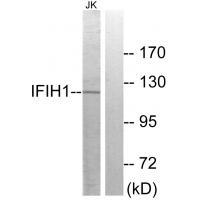
| WB | 1/500-1/3000 | Human,Mouse,Rat |
| IF | 咨询技术 | Human,Mouse,Rat |
| IHC | 咨询技术 | Human,Mouse,Rat |
| ICC | 技术咨询 | Human,Mouse,Rat |
| FCM | 咨询技术 | Human,Mouse,Rat |
| Elisa | 咨询技术 | Human,Mouse,Rat |
| Aliases | Interferon-induced helicase C domain-containing protein 1; EC 3.6.1.-; Interferon-induced with helicase C domain protein 1; Helicase with 2 CARD domains; Helicard |
| Entrez GeneID | 64135; |
| WB Predicted band size | 120kDa |
| Host/Isotype | Rabbit IgG |
| Antibody Type | Primary antibody |
| Storage | Store at 4°C short term. Aliquot and store at -20°C long term. Avoid freeze/thaw cycles. |
| Species Reactivity | Human |
| Immunogen | Synthesized peptide derived from C-terminal of human IFIH1. |
| Formulation | Purified antibody in PBS with 0.05% sodium azide. |
+ +
以下是3篇与IFIH1抗体相关的文献摘要概括:
1. **文献名称**: "Autoantibodies against MDA5 in dermatomyositis: clinical associations and diagnostic utility"
**作者**: Sato S et al.
**摘要**: 该研究探讨抗MDA5(IFIH1编码蛋白)抗体在皮肌炎患者中的临床意义。发现抗体阳性与临床无肌病性皮肌炎(CADM)和快速进展性间质性肺病(RP-ILD)显著相关,提示其作为预后标志物的潜在价值。
2. **文献名称**: "IFIH1 autoantibodies in type 1 diabetes: a marker of viral-triggered autoimmunity?"
**作者**: Alkemade FE et al.
**摘要**: 研究提出IFIH1抗体可能与1型糖尿病中针对β细胞的自身免疫反应有关,推测病毒感染通过激活MDA5通路触发抗体产生,为疾病机制提供新视角。
3. **文献名称**: "Anti-MDA5 antibody as a predictor of interstitial lung disease in juvenile dermatomyositis"
**作者**: Sabbagh S et al.
**摘要**: 在青少年皮肌炎患者中,抗MDA5抗体被证实与间质性肺病(ILD)的发生率和严重程度相关,建议早期筛查以改善管理策略。
4. **文献名称**: "Distinct interferon signatures of anti-MDA5 and anti-SAE antibodies in dermatomyositis"
**作者**: Bai Y et al.
**摘要**: 通过比较抗MDA5与其他自身抗体(如抗SAE)的干扰素信号特征,揭示抗MDA5阳性患者具有独特的I型干扰素高表达模式,可能与特定临床表现相关。
以上研究均聚焦于IFIH1/MDA5抗体在自身免疫疾病中的诊断、预后及机制作用。
IFIH1 (Interferon Induced with Helicase C Domain 1), also known as MDA5 (Melanoma Differentiation-Associated protein 5), is a cytoplasmic RNA helicase involved in innate immune responses. It detects viral double-stranded RNA (dsRNA) and activates antiviral signaling pathways via mitochondrial antiviral-signaling protein (MAVS), leading to the production of type I interferons (IFNs) and pro-inflammatory cytokines. IFIH1 antibodies are autoantibodies targeting this protein, often associated with autoimmune disorders.
In autoimmune conditions like Aicardi-Goutières syndrome (AGS) and certain forms of type 1 diabetes, IFIH1 gain-of-function mutations or dysregulated expression can trigger aberrant interferon signaling, contributing to pathogenesis. Autoantibodies against IFIH1 are also observed in rare cases of dermatomyositis and systemic lupus erythematosus (SLE), potentially serving as biomarkers for disease subsets.
Research on IFIH1 antibodies explores their diagnostic utility and role in disease mechanisms. For example, in type 1 diabetes, these antibodies may reflect immune activation against pancreatic β-cells. Detection methods like ELISA or immunoprecipitation are used to identify IFIH1 autoantibodies, aiding in clinical stratification. Additionally, therapeutic strategies targeting IFIH1 or its signaling pathways, such as JAK inhibitors, are under investigation to mitigate interferon-driven autoimmunity.
Understanding IFIH1 antibody dynamics bridges virology, immunology, and clinical medicine, offering insights into autoimmune triggers and precision therapies.
×